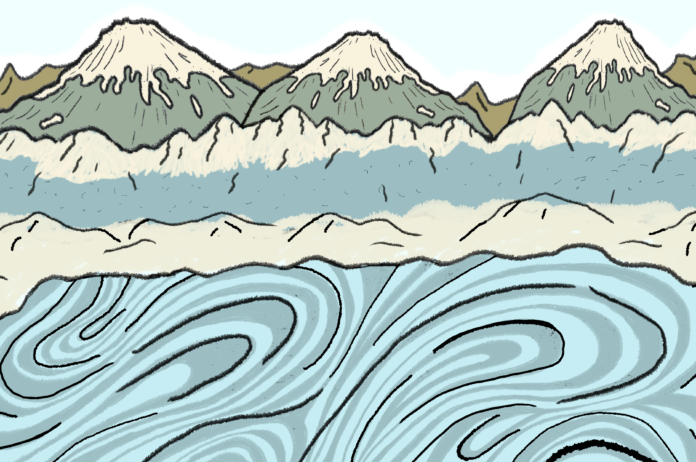Graduate students at UC Davis get a firsthand look at climate change through their research
Experts find it alarming that a body of water as big as the Laptev Sea in Russia is no longer freezing at its general rate. The sheet of ice on the Laptev Sea is nonexistent this year in comparison to past years. A growing quantity of greenhouse gases is to blame for the increase in ocean temperature, record breaking heat waves and the sea ice melting quicker—all factors contributing to the current lack of ice.
Climate change is also causing warm Atlantic currents to get pushed into the Arctic, which disrupts the stratification of warm waters at depth and cold waters at the surface, making it harder for ice to form. The ice that was supposed to form in the Laptev Sea normally drifts to the Fram Strait, carrying nutrients to the Arctic plankton. Since the ice is either not forming or just melting quicker, there will be less ice drifting and less nutrients for the plankton. This results in a dangerous cycle: the plankton is not able to retrieve carbon dioxide from the environment due to lack of energy from low nutrients available for consumption. As a result, the amount of greenhouse gases in the atmosphere increases.
The Laptev Sea not freezing is a global headline, and while it is important, there are other aspects of the ocean being affected by climate change, evident in the work being done by graduate students at UC Davis. Their research shows the biological side of climate change and how marine organisms are affected by the changes occurring in the ocean.
Helen Killeen, a Ph.D. candidate in ecology at UC Davis, connects the physical side of the ocean to biology and ecology. Her research focuses on understanding how larval fish move throughout the coast to better conserve fish populations within marine-protected areas. The fish studied move about predominantly by currents, and research has shown that patterns in the California current system are likely to change due to climate change.
Furthermore, research has shown that the northwesterly winds will get stronger, leading to more upwelling—vertical motion in the ocean where deep waters come up to the surface—according to Killeen. Although there are contradictory studies claiming that the winds will not be affected by climate change, Killeen noted that understanding the impact of wind patterns on animals now will help us determine the impact of climate change in the future.
“If climate has an impact on wind and current patterns on the California coast, then we better understand how winds and currents are important for animals so we can make predictions about how climate is likely to impact marine populations,” Killeen said.
Killeen is not the only graduate student whose work is affected by climate change. Priya Shukla, a Ph.D. student at Bodega Marine Lab at UC Davis, is studying how warming is affecting oyster farming in California by working with the Hog Island Oyster Company in Tomales Bay, an estuary one hour north of the Golden Gate Bridge.
“I would say climate change is driving my research questions,” Shukla said.
Every summer, a high mortality of oysters is normal and expected because of the higher temperatures of the season. But in Tomales Bay, there is another factor that increases oyster mortality in the species Crassostrea gigas, the Pacific Oyster—the Oyster Herpes Virus.
This virus, also labeled as OsHV-1, becomes more infectious with higher water temperatures which are becoming more common—again due to climate change. Water at 60 degrees Celsius can cause an outbreak, followed by a high rate of oyster mortality. Thus, global temperature rise may make this virus more prone to spreading and will hurt the oyster population. Although the virus is deadly in oysters, humans cannot get the virus from eating an infected oyster.
Another organism that is affected by warming ocean temperatures is kelp. Kristen Elsmore, a Ph.D. candidate at UC Davis, researches kelp forests and aquatic vegetation in coastal waters. Kelp forests are important because they are a live habitat-forming species and their presence influences the currents and waves heading toward shore. Kelp is vulnerable to warmer waters as higher temperatures lead to more kelp populations dying. This has a dramatic effect on the whole ecosystem, according to Elsmore.
“If we see these warmer waters and we lose kelp in [these] areas, then these massive structures and big habitats that support hundreds of species […] will also go away, and those species that rely on the kelp and the structure of the kelp will also disappear from our nearshore waters,” Elsmore said.
Commenting on the Laptev Sea phenomenon, Killeen said, “Scientists knew that these things would happen eventually, but the speed at which they are occurring and the scale at which they are happening is surprising scientists even now.”
From what she is witnessing through her research, Elsmore emphasized that the effects of climate change are real and tangible.
“This is a problem that we can identify, see and quantify right now,” Elsmore said.
Written by: Francheska Torres — science@theaggie.org





